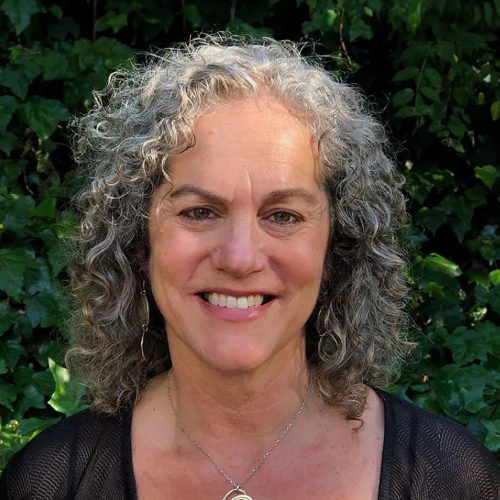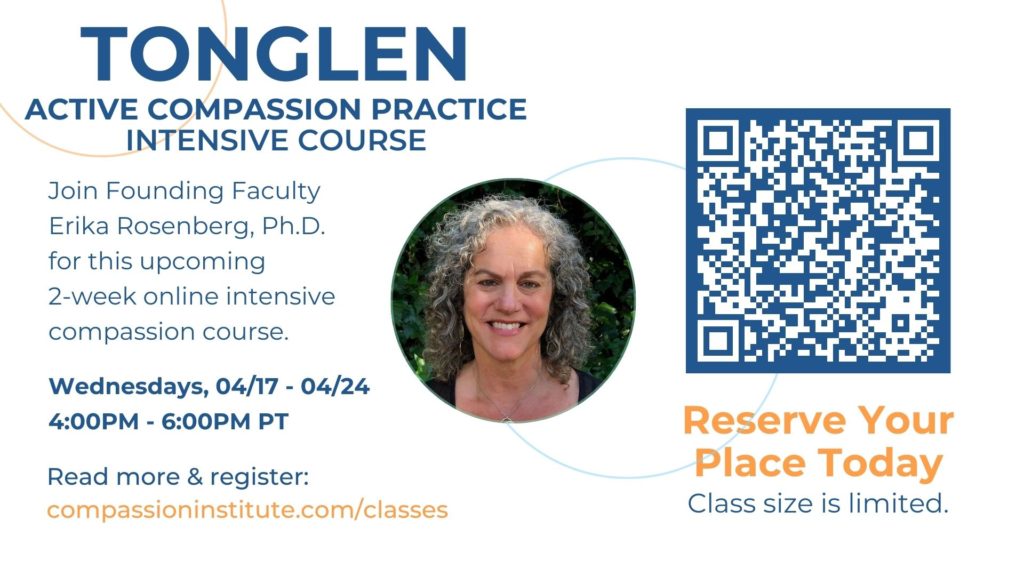Articles
What we’re contemplating, doing, and reading.
Founding Faculty & CCT™ Teacher Spotlight: Erika Rosenberg, Ph.D.
We’re honored to have Compassion Institute Founding Faculty Member Erika Rosenberg teaching both the Tonglen Intensive and Compassion Cultivation Training© (CCT™) with us.
Dr. Erika Rosenberg is a scientist and meditation teacher, who was part of the original team with Thupten Jinpa, Ph.D. who developed CCT™ at Stanford University. She is a world-renowned expert on facial expression of emotion and a meditation teacher who specializes in emotion and compassion cultivation. Erika was also a senior investigator on the Shamatha Project (a comprehensive, scientific study of the effects of intensive meditation), is on the research team of the Pathways project on Compassion Meditation at the Center for Mind and Brain at U.C. Davis, and is faculty at The Nyingma Institute of Tibetan Studies, Berkeley.
Erika has taught in places as diverse as Google, Inc., Lerab Ling Monastery, LucasFilm, Upaya Zen Center, and Burning Man. She has published numerous books, scientific articles and chapters on facial expression, emotion, and meditation. Additionally, Erika is also an active volunteer in psychedelic harm reduction in The Zendo Project.
Read below to discover what else Tori Sarris — CI’s Program Manager, Public Programs — discovered about Erika and her deep wisdom around compassion and Tonglen in her interview for this special Teacher Spotlight.
As you’ll discover,”Tonglen” is an ancient, imagery-based active compassion practice that exercises your willingness to do something for somebody who needs help (including yourself).
What is one insight from Tonglen that you would share with anyone?
There are so many! Tonglen is a powerful method for learning to be brave and kind, for becoming more comfortable with adversity, and for growing your heart. It’s also powerful for activating your sense of wanting to do something to alleviate suffering for everyone — including yourself. It teaches us how to hold the opposites of joy and pain that life dishes up. When done regularly (and properly), Tonglen is a life-changing practice.
How can Tonglen help people expand their compassion or mindfulness practice?
Tonglen incorporates both compassion and mindfulness, so in practicing Tonglen you strengthen both. You must be aware of what’s happening in the world in order to do the practice, you must be aware of the way you feel when you notice suffering, and then be able to connect to the pervasiveness of suffering. Suffering is everywhere; it’s so universal that it brings us together. When you can see this, realize this, and feel this, a compassionate response is inevitable. Tonglen teaches you how.
Can you share a time in your life that you have utilized Tonglen?
There are so many. First of all, Tonglen is a great practice to do when you feel like there’s nothing you can do to change an incredibly difficult situation, but you have to be there with it. So, it can range everywhere from frustrating professional situations or awkward social situations to situations in which someone is suffering from an unbearable difficulty that you cannot fix for them.
I have used Tonglen for myself and others (privately, in my own practice) in both work (see this blog) and personal contexts. It always helps, if only to help me be with it open-heartedly.
For me, the most powerful instance of this was when my father was dying, and I spent endless hours by his bedside. Dad was in pain, actively dying, and there was nothing I could do but be there. He was attended to. He had his pain meds. He was at home in the living room and surrounded by loved ones. But every day he was moving closer to death. He was in pain. I sat there with him for hours practicing for him, for us, for the world. And for everyone dying or who is with a dying loved one.
I practiced like this with Dad for hours and hours over several days. Eventually, the practice just enveloped both of us totally — though I’m sure he had no idea what I was doing (he was just glad I was there, as he drifted in and out of consciousness). It was the most transformative experience of my life. When my father eventually died about a week later, I was there at his bedside with all the family around him, and I was accommodating his last breath with warmth. It also helped all my grieving relatives who were gathered there, around Dad. The loss was agonizing, but the love was amazing.
You’re invited to join Erika Rosenberg, Ph.D. for her online Active Compassion Practice: Tonglen Intensive Course — taking place April 17th & 24th, 2024.
Click here to find other upcoming Compassion Institute programs.




